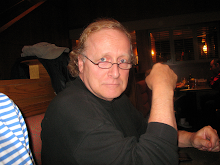Tribune-Chronicle Editorial: Embrace the insight of futurist--A week ago this past Thursday, Gloria and I hopped over to Youngstown for the day to meet
Alvin and Heidi Toffler, who are there because of the leadership initiative and community dialogue being promoted by
Congressman Tim Ryan. The
Tribune-Chronicle came out with an editorial on the event
yesterday, and two articles, one on
March 9th and the other on
March 11th. Ed Morrison's weighed in yesterday
with a comment on BFD. I'm sold on Youngstown.
I've followed Toffler since the late '60s and early '70s, when he came out with the paperback of many colors that everybody had on the beaches for a couple of summers. Back then, his futurism came for us as the logical extension of things like the advertising commentary of
Vance Packard and
The Hidden Persuaders, the upbeat communications ideas of
Marshall McLuhan, and the forward-looking mysticism of
Teilhard de Chardin. I fell out of touch over the years, but the Tofflers kept on thinking and writing about the idea of this new
Third Wave we have been riding since 1956 and fleshing out the ideas of this transformation, as it became more manifest. Before going to Youngstown, I lined up all the Toffler books I could from the library and skimmed over them, only to find that things I thought were my ideas were actually things the Tofflers had put into my head years ago. Humbled and in touch with basic realities, I climbed into the car and made the pilgrimage. These are exciting times.
At the afternoon session at the
Butler Museum of American Art, we ran into
Hunter Morrison, Janko of the I Will Shout Youngstown blog,
Jim Cossler of the Youngstown Business Incubator, and
Allen Hunter of the YSU chemistry department. The main idea I took out of this introductory Toffler talk was that there are people and institutions with vested interests in the old organizations--the unions, the hospital systems, the government, to name but a few--who are going to resist the shift to the new knowledge economy, and have to be dragged kicking and screaming out of their comfort zones. I've been thinking this all along, but it was good to have these thoughts validated, that we as a society are our own worst enemies.
In the museum, we had lunch in
Winslow's Thymely Cafe and then got the Cook's tour treatment by
preeminent Youngstown ambassador Janko, a cosmopolitan young fellow just returned from the Netherlands and working in Columbus. We ran through the museum, over the YSU campus, through the gardens, into the student center, through one of the world's largest Arby's (world HQs in Youngstown?), down the hill, past a Michael Graves post-modern work, past the square, through the YBI, onto the bus, and back to our cars for the quick hop over to the Stambaugh Auditorium, where we found that, if you're good enough to play Youngstown, you can play Carnegie Hall. Janko's commentary was incredible.
Mike Gesing, you have to get him on tape, now.
At dinner, we got a chance to spend a few minutes with the Tofflers themselves before they spoke, and at our table were two
Toffler Associates, Bonnie Wald and Dick Szafranski. These folks, the Tofflers, have some momentum behind them, I'm beginning to think. The speech was good, the crowd was appreciative, Stambaugh was a marvel to behold. We left with
a great impression of Youngstown; most of my preconceptions were shattered. The people are gracious, they are proud and enthusiastic, they know how to put their best foot forward. They don't understand the bum rap they get. Now, neither do I.
I am now reading
Revolutionary Wealth; it's pulling it all together for me; it's dramatically shortening my learning curve; I'm getting lots of wows and ahas and wearing out my yellow highlighter. Gloria is reading another copy simultaneously. I guess we feel this must be extremely important--we've never done this reading-in-tandem thing before. We have always had a growing sense of purpose, but now we have an acute sense of urgency. The Tofflers are catalysts, and quiet leaders.




